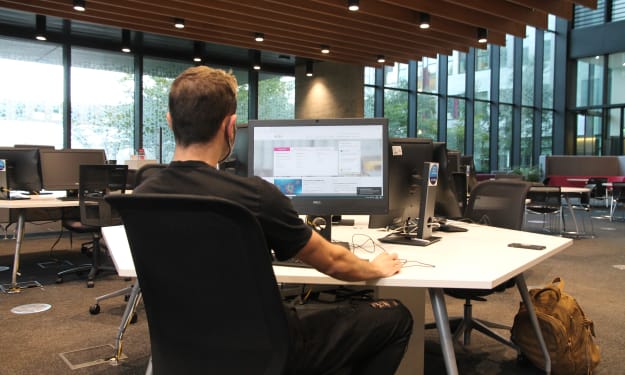This is Why Financial Perspective Matters for Your Mental Health
Is your mental wellbeing connected to your bank account?

23 years passed since The Notorious B.I.G. explained how mo' money brings mo' problems. I'm taking P. Diddy's word for it, as he's the authority on having too much money.
However, less money brings mo' problems too. Lack of financial freedom can lead to the development of mental health problems, according to the peer-reviews of 50 relevant studies. Anxiety, depression, self-doubt, guilt, and sexual dysfunctions can stomp on your well-being when you're overthinking how to pay rent and what to eat tomorrow.
The psychology behind basic needs
You're hardly sleeping well if Maslow's pyramid of needs stands on shaky grounds. According to Abraham Maslow, a famous behavioral psychologist, basic needs are food, water, housing, security, warmth, and rest.
Human beings are not having a good time without food and shelter.
I've recently tapped into the subtle feeling of financial security, and the anxieties, depression, and overall living intensity subsided. The best thing I've done for my mental health lately was to keep my bank accounts in check.
The despair of not expecting a paycheck
I booked a one-way flight to Ibiza together with my best friend in my early twenties. We arrived on the Balearic island to get real-life experience.
I was finishing my third year of University, and I could offer the minimum working experience I had from summer gigs at my father's company. But you couldn't really call that work, as I mostly helped with administrative tasks of recording clients' information.
I kind of knew how to handle an espresso machine too, but the coffee wasn't what you'd get at Starbucks. I had zero employable skills. Yet, we thought we could make it on a Spanish island, even though we didn't even speak the language.
The Masterplan was to get a commission-based sales job in Playa D'en Bossa, a popular Ibiza beach. We got the job alright, but it turned out that people wouldn't buy stuff just because stuff is being sold.
You need knowledge, experience, and a bit of luck to make a sale on the spot. We found out that we had no skill or talent to sell stuff to tourists. I made only $12 (10€) selling a club ticket to a guy I met on the plane to Spain. After a lot of public embarrassment, our budgets ran out. The already amplified anxiety spiraled out of control, and one morning, my best friend and I started screaming at each other over a $2 jug of milk.
I don't even drink milk.
That argument was hilarious, and as soon as we realized we're fighting over milk, we both burst into laughter that carried our mood throughout the day. We both had already lost 20 pounds, and our faces looked 10 years older. Days felt like weeks, and weeks felt like lifetimes. Eventually, we lost the roof over our heads and were forced to ask random people to sleep at their couches.
We got the real-life experience, alright.
Neither of us asked for money from home. We were determined to make something out of our journey. Eventually, we got menial jobs at bars and restaurants and earned enough money to come back home. We both started the next university year soon after.
Out of many lessons from that summer, I learned just how strongly your finance affects your mental health. You're prone to irritation, extreme reactions and outbursts, depression, self-doubt, and self-loathing when you don't know how to afford food and shelter. I can't even comprehend how it feels to hit the financial wall while having a family that expects you to bring food on the table.
Financial trouble and the lack of perceived opportunity can lead to most extreme behaviors. Suicide among men jumped by 7.5% in some places during the Great Recession of 2009, accounting for 10,000 more dead in the western world.
Always have three months' rent on hand
Existential fears are no joke, especially when dealing with a lack of future opportunities and overall hope. Here's what you can do right now to help improve your financial and mental well-being:
Don't overspend to impress people. Not being able to afford dining-out, having drunks at the bar, and buying the latest iPhone is not your life's final destiny. When you have a positive financial picture, you can buy whatever you want. But if you don't get your spendings in check right now, you might never drag yourself out of the financial black hole you're creating by overspending on stuff you don't need.
Save enough money to have 3 months' rent on hand. Before thinking about investing money, buying stocks, or starting a business, make sure you can afford the basic Maslow's needs for 3 months. 90 days should be enough to give you enough time to switch careers, start a business, and find a new job. I've quit working for National Geographic in February, and my savings have saved me from extreme decisions and accepting desperate work.
Finally, invest the money you have on the side. When you know that your money is making money and that you have enough juice to survive months on end, then you can relax and lay back for a minute. You can buy that new Apple gadget without feeling guilty or distressed. You can take your partner for a round trip to Paris and find a new spark in your relationship. Personal life goes smoother when you're financially sound.
Financial safety and mental health are long-term games. Stability depends on long-term decisions. Many other things in life are better on impulse, but finance and mental health rarely benefit from hasty decisions.
Maybe you don't need to buy that 4th pair of shoes this month, three pairs are good enough to cover your feet while walking. Maybe you don't need to have the latest iPhone straight on release. Maybe right now, you're life need stability over excitement.
Final Words
Mental health is connected to your bank account. You probably can't solve all your problems with money, but understanding that financial safety plays a key role in the overall quality of life can help balance your future decisions.
The greek philosopher Epicurious believed that happiness comes from having three elements in check: Friends, financial independence, and self-reflection.
Financial stability is one of the key requirements for happiness and can be detrimental to both mental and physical health. A healthy account balance keeps the shrink away and brings together your friends and family.
About the Creator
Toni Koraza
Curious Fellow | Founder at madX Digital and 2 Minute Madness |






Comments
There are no comments for this story
Be the first to respond and start the conversation.